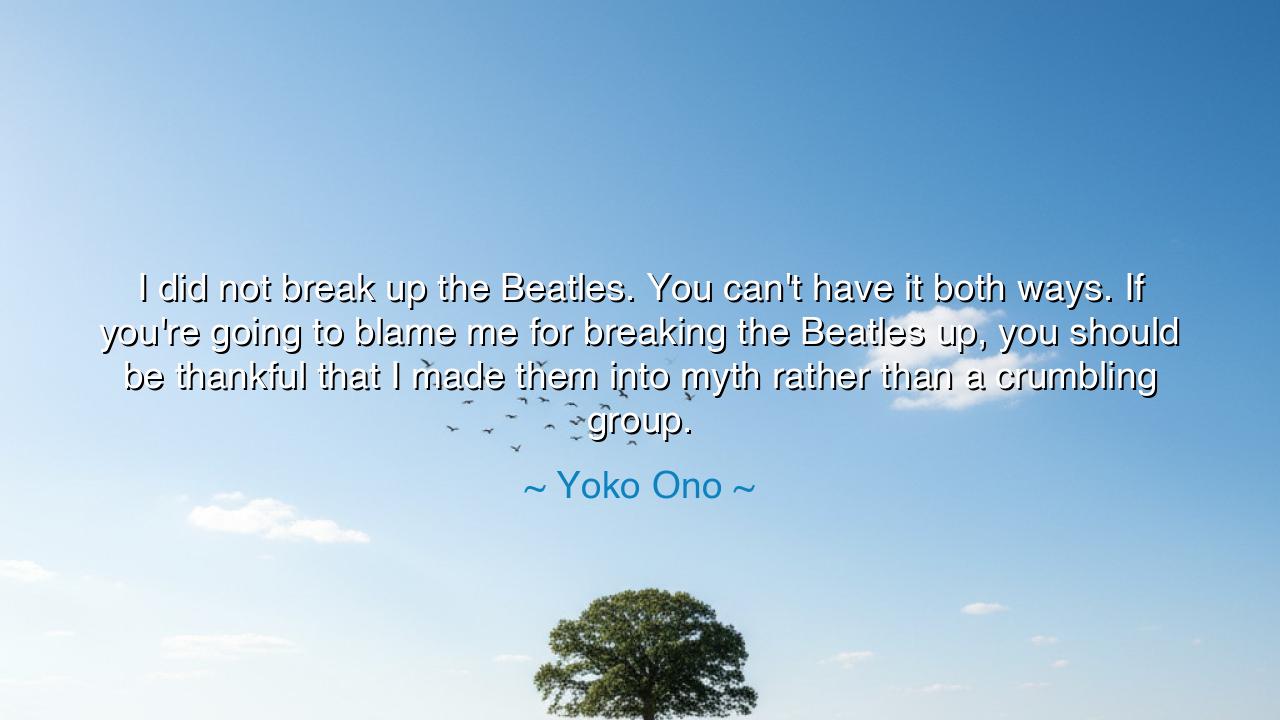
I did not break up the Beatles. You can't have it both ways. If
I did not break up the Beatles. You can't have it both ways. If you're going to blame me for breaking the Beatles up, you should be thankful that I made them into myth rather than a crumbling group.






Hear the words of Yoko Ono: “I did not break up the Beatles. You can't have it both ways. If you're going to blame me for breaking the Beatles up, you should be thankful that I made them into myth rather than a crumbling group.” These words are heavy with defiance, but also with clarity. They are the voice of one long accused, yet still unbowed, who claims her place in the story of a legend. Beneath them lies a profound truth about endings, transformation, and the power of perspective. For in the passing of one age comes the birth of another, and sometimes it is not destruction but myth-making that ensures immortality.
The origin of this saying rests in one of the most famous partings in modern history: the dissolution of the Beatles. For years, many laid the blame for this ending upon Ono, the partner of John Lennon, seeing her as the disruptive presence that fractured harmony. Yet she counters this accusation with wisdom: the group was already unraveling, its members weary, its unity fractured. If it had lingered on, it might have fallen into mediocrity, tarnishing its greatness. By ending when it did, it became more than a band—it became myth, eternal in memory, forever frozen at the height of brilliance.
History, too, tells us of such transformations. Think of Alexander the Great, whose empire fractured after his death. Had he lived longer, perhaps his dominion would have weakened, his legend diminished by decline. Yet because he fell at his zenith, his name endures as immortal, his story told not as that of a fading king, but as one of destiny and flame. In the same way, Ono’s words teach us that sometimes what seems like ruin is actually the sealing of a legacy, preserving greatness from decay.
There is also a teaching here about scapegoating and truth. The world, longing for a simple story, often seeks a single person to blame when great things fall apart. It is easier to accuse one than to understand the complexity of many forces. But Ono’s words strip away this illusion: the Beatles’ end was inevitable, born of growth, change, and human frailty. Her defiance is not arrogance—it is a reminder that endings are part of every story, and that they need not be seen only as failure.
Yet her declaration carries also a hidden note of gratitude. “Be thankful,” she says, “that the Beatles became myth.” This is not mockery, but instruction: learn to give thanks that brilliance, though brief, was preserved in memory untarnished. Better to remember the band as eternal youth, as visionaries who reshaped music, than to watch them wither into irrelevance. The ancients always honored the fleeting flame more than the cold ember, for the flame burns into memory, while the ember fades without mark.
What lesson, then, must we carry from her words? That every ending can be seen through two lenses: as a loss or as a transformation. Those who cling only to grief will see only the break, the fracture, the disappointment. But those who choose wisdom will see the myth born of the ending, the legacy sealed by departure, the immortality granted by leaving at the height of power. To be thankful even in endings is to carry forward the beauty of what was, without bitterness.
Practical actions arise from this teaching. When something great in your life ends—whether a friendship, a career, or a dream—resist the temptation to cast blame. Instead, honor it for what it gave you, and be thankful that it lived in greatness, even if only for a season. Speak of it with reverence rather than regret, for in your memory you hold the power to turn it into legend. And when others seek to simplify blame, be the voice that says: endings are complex, and greatness is preserved by how we choose to remember.
Thus, let Yoko Ono’s words endure: do not see only destruction in the closing of a chapter, but also the birth of myth. For what ends with honor does not truly die—it becomes eternal in the stories we tell, and in the gratitude we carry for the brilliance it once gave the world.






AAdministratorAdministrator
Welcome, honored guests. Please leave a comment, we will respond soon